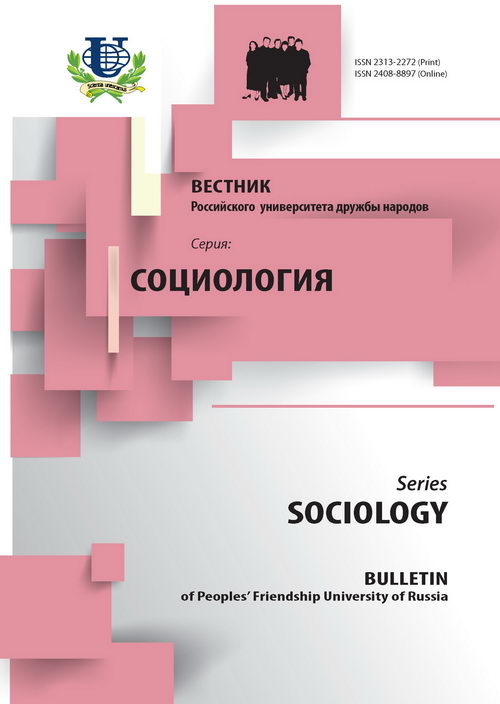A Sociological Approach to the Study of Household Access to Drinking Water in the Former Soviet Union Countries
- Authors: Roberts B1, Stikley A2, Herpfer C3, McKee M1, Gasparishvili AT4, Kruhmaleva OV4
-
Affiliations:
- The European Centre on Health of Societies in TransitionThe London School of Hygiene and Tropical Medicine
- Södertörn University
- Aberdeen University
- The Center for Sociological StudiesLomonosov Moscow State University, Russia
- Issue: No 3 (2012)
- Pages: 60-69
- Section: Articles
- URL: https://journals.rudn.ru/sociology/article/view/6377
Cite item
Full Text
Abstract
The article deals with the analysis of the data of the sociological study Health of Societies in the Times of Transition (HITT) carried out in 2010, which investigated, in particular, the changes in the population's access to piped household water in the former Soviet Union countries between 2001 and 2010, and examines how these depended on the household's economic status. The paper is based on 2 international research projects: The Living standards, Lifestyles, and Health (LLH) project of 2001 and the follow-up study carried out in 2010 - Health in the Times of Transition (HITT). This article is addressed to experts in sociology, statistics, social work and health, as well as a wide range of people interested in the changes in the social and economic situation in the former Soviet Union.
About the authors
B Roberts
The European Centre on Health of Societies in TransitionThe London School of Hygiene and Tropical Medicine
Author for correspondence.
Email: bayard.roberts@lshtm.ac.uk
The European Centre on Health of Societies in TransitionThe London School of Hygiene and Tropical Medicine
A Stikley
Södertörn University
Email: andrew.stickley@sh.se
Стокгольмский центр здоровья переходных обществ; Университет Седертерн; Södertörn University
C Herpfer
Aberdeen University
Email: c.w.haerpfer@abdn.ac.uk
Факультет политики и международных отношений; Абердинский университет; Aberdeen University
M McKee
The European Centre on Health of Societies in TransitionThe London School of Hygiene and Tropical Medicine
Email: martin.mckee@lshtm.ac.uk
The European Centre on Health of Societies in TransitionThe London School of Hygiene and Tropical Medicine
A T Gasparishvili
The Center for Sociological StudiesLomonosov Moscow State University, Russia
Email: gasparishvili@yandex.ru
The Center for Sociological StudiesLomonosov Moscow State University, Russia
O V Kruhmaleva
The Center for Sociological StudiesLomonosov Moscow State University, Russia
Email: kruhoks@yandex.ru
The Center for Sociological StudiesLomonosov Moscow State University, Russia
References
- Progress v oblasti sanitarii i obespecheniya pit'evoi vodoi. VOZ/YuNISEF. - Zheneva-N'yu-Iork, 2010. - URL: <http://www.unicef.org/media/files/JMP-2010Final.pdf>.
- Bartram J., Cairncross S. Hygiene, sanitation, and water: forgotten foundations of health // PLoS Med. - 2010. - № 7(11).
- Davis, J. and D. Whittington. Challenges for water sector reform in transition economies. Water Policy, 2004. 6: p. 381-95.
- Egorov A., et al. Deterioration of drinking water quality in the distribution system and gastrointestinal morbidity in a Russian city // International Journal of Environmental Health Research. - 2002. - № 12(3).
- Ford T.E. Microbiological safety of drinking water: United States and global perspectives // Environmental Health Perspect. - 1999. - № 107. - Supplement 1.
- Gleick P. Basic water requirements for human activities: meeting basic needs // Water International. - 1996. - № 21.
- Greenland S. On sample-size and power calculations for studies using confidence intervals // American Journal of Epidemiology. - 1988. - № 128(1).
- Hall D., Popov V. Privatisation and restructuring of water supply in Russia and Ukraine. - 2005. - January.
- Kukharchyk T., Khomich V. Drinking water supply in Belarus: sources, quality and safety, in Risk Management of Water Supply and Sanitation Systems / P. Hlavinike, et al. (ed.). - Springer: Dordrecht, the Netherlands, 2009.
- Kuznyetsov V. Urban water resources management in Ukraine // Intergrated Urban Water Resources Management / P. Hlavinek, et al. (ed.). - Springer: Dordrecht, the Netherlands, 2006.
- Lack T. Water and health in Europe: an overview // BMJ. - 1999. - № 318(7199).
- McKee M., et al. Access to water in the countries of the former Soviet Union // Public Health. - 2006. - № 120(4).
- Mkhitaryan L. Towards performance based utility sector in Armenia: case of drinking water supply services. - Caucasus Research Resource Centers: Yerevan, 2009.
- Moe C.L., Rheingans R.D. Global challenges in water, sanitation and health // Journal of Water Health. - 2006. - № 4. - Supplement 1.
- Morton H. Housing in the Soviet Union // Proc Acad Polit Sci. - 1984. - № 35.
- Morton H. Who gets what, when and how? Housing in the Soviet Union // Soviet Studies. - 1980. - № 32.
- OECD EAP task force, financing water supply and sanitation in Eastern Europe, Caucasus and Central Asia. - Paris: Organisation for Economic Co-Operation and Development, 2006.
- Prüss-Üstün A., et al. Safer water, better health: costs, benefits and sustainability of interventions to protect and promote health. - Geneva: World Health Organization, 2008.
- Renaud B. The housing system of the former Soviet Union: why do the Soviets need housing markets? // Housing Policy Debate. - 1992. - № 3.
- Soares L., et al. Inequalities in access to and use of drinking water services in Latin America and the Caribbean // Pan Am J Public Health. - 2002. - № 11.
- Szewzyk U., et al. Microbiological safety of drinking water // Annual Review of Microbiology. - 2000. - № 54.
- World Health Organisation. European health for all database (HFA-DB). 2010. - URL: <http://data.euro.who.int/hfadb/>.
- World Health Organisation. Public water supply and access to improved water sources. 2009. - URL: <http://www.euro.int/ENHIS>.
- World Health Organisation/UNICEF. Joint Monitoring Programme (JMP) for Water Supply and Sanitation. 2011. - URL: <http://www.wssinfo.org/documents-links/documents/?tx_ displaycontroller[type]=country_files>.













